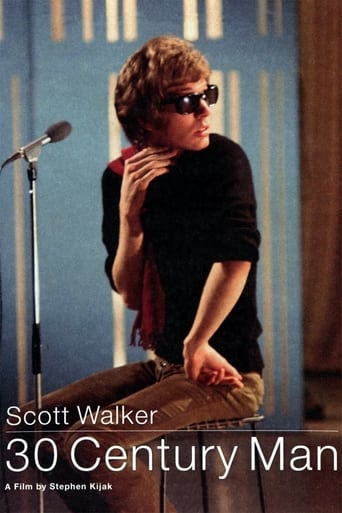

It's no definitive masterpiece but it's damn close.
... View MoreIt's the kind of movie you'll want to see a second time with someone who hasn't seen it yet, to remember what it was like to watch it for the first time.
... View MoreThe tone of this movie is interesting -- the stakes are both dramatic and high, but it's balanced with a lot of fun, tongue and cheek dialogue.
... View MoreAn old-fashioned movie made with new-fashioned finesse.
... View MoreI can understand why a previous reviewer mistook this at first for a mockumentary. It is jargon-loaded, trivia-burdened, and at times downright (unintentionally) comic-pompous. Walker had a fine mellow voice for ballad singing and expressed some originality in a very few later songs, but aside from this? Why drag in everyone who knew him and/or once grooved on his music and lyrics so they can be mugshot while straining to convince us he's some kind of unsung (pun intended)phenom all of us should recognize and appreciate? If this was the intended theme and purpose of the film, it is an utter failure, suggesting the mystery of Scott Walker's life is that there is no mystery.If the film makers are trying to make some other point (as is achieved in better music bio films), it's not clear what that might be. It doesn't help that some of his incomprehensible pseudo-poetic lyrics are scrolled in the background.Several of the commentators are as embarrassingly inarticulate as Walker's own more "advanced" lyrics are. (Are we sure this isn't a mock-umentary?) Where was the director/editor in all this rambling? Off somewhere grooving on Walker's earlier recordings? Interestingly, the most intelligent comment comes briefly from Sting when he begins to talk about the dark side of romanticism, etc. It's a shame he (or somebody) wasn't given more time to explore the significance of Walker's life. Scott Walker was not one of the greatest musical/poetry talents of the last forty years, but surely he deserves better than this inept bio-film.
... View MoreWatching this movie created a strange feeling in me.For quite a few minutes into this film, I though it to be a mockumentary in the style of "This is Spinal Tap". A teenager (in a band) in the late sixties, I thought I new quite a bit about the music of the time.Yet, in spite of the film's obsessing of Walker's work and its impact, I had no recollection of him whatsoever. I thought the film was a joke.Only when the story began to weave in interviews from people I knew did I begin to think this might be a factual story. Then, when I heard "The Sun Aing't Gonna Shine Anymore", I recognized a hit I had heard (my after-the-fact research shows that the Walker Brothers had only two top 40 hits: this one, which reached #13, and an earlier one "Make It Easy On Yourself" which reached #16 in 1965 and 1966).So I became convinced Walker was real--for a while. As I listened to some of Walker's stranger efforts I again thought the film might be a put-on. The two hits I mentioned? I began to think they were done by another group (or even Engelbert Humperdinck, whose voice is similar to Walker's).In the end, though, Walker is very real. As to rather the film is a put-on, you'll have to see it and make up your own mind. Some of Walker's music is very interesting (the spacey, avant garde stuff is unusual and unlike anything I've heard). Some is just nice, soothing pop (the two hits). Most of it does not stand the test of time well.So there's the rub, the reason I rate this film only 4 stars, and the reason the film is not as enjoyable as it might have been. The producers' intentions are vague and the true spirit of the film is impossible to discern for certain.At the outset, had they mentioned the subject of the film was very real (even though we might not have heard of Scott Walker) and put the film in context, things might have been different. Instead, they seemed to assume we'd all know him, admire his work and think of him as an icon. We don't know whether they're making fun of Walker, of us, or both.Perhaps things are different in the UK, but in America, Mr. Walker is not an icon, even though perhaps it could have turned out otherwise.
... View MoreMore than five years in the making, filmmaker Stephen Kijak gave us a chance to spend some time with Scott Walker, or Noel Scott Engel (his real name if you prefer), and listen to other collaborators and musicians who have been touched by Scott, talking and commenting while listening to selections of Scott's music presented during interviews. Scott, the consummate and committed songwriter-poet-explorer of the 'un-tread' territories of the senses, intrepidly transforms his internal imagery and inherent clues into his unique music, 'avant-garde' or otherwise (as demonstrated in his albums "TILT" 1995 Fontana Records UK, and "THE DRIFT" 2006 4AD label).From the beginning of the reel, we can tell he's a soft-spoken man, an ordinary looking man (regular guy) now in his sixties (he was quite a heart-throb, in his curly pop hairdo and husky low tone with his guitar, being the lead singer of the famed Walker Brothers circa 1964-66). He's not flashy or arrogant (as you might think pop culture idols would be), actually he's downright shy, sort of hiding away under his baseball cap. Once you hear him speak, passionately about his music, offering amusing anecdotes of 'yesteryears', you will be absorbed into this world of Scott Walker and wanting to know as much as you can about him, go checking on the Web for his music, album availability, even his song lyrics, without hesitation. (There's a substantial database of lyrics site at "scottlyrics.vniversum.com/".) Amazon.com seem to have a comprehensive source for all Scott Walker's albums, from Scott '1' (the Jacques Brel period), Scott 2, 3, 4, "Tilt" and "The Drift", including "Nite Flights" 1978 - the one-time reunited Walker Brothers album (MP3 album 'downloadable'), more Scott solo efforts like "Climate of Hunter" 1984, "Pola X" 1999 film soundtrack of nonconforming French director Leos Carax, "And Who Shall Go to the Ball? And What Shall Go to the Ball?" 2007 orchestral piece in four movements by 4AD label.He is, indeed, a 30 Century Man, a poetic purist at heart. His meticulous care in composing guitar chords for his songs as composer Hector Zazou pointed out as he wondered how Scott had in-tune and out-of-tune chord arrangements at the same time - true genius recognition, alright. Collaborating arranger & keyboard player Brian Gascoigne explained how Scott went for the unconventional - the in between 'chord' and 'dis-chord' and holding for 16 bars. It's amazing just 'soaking up' the many shared accounts described by Scott's fellow musicians, colleagues, and managers. "His lyrics are peerless," so Brian Eno admirably confirmed. David Bowie is executive producer to this documentary film of Scott Walker, who is definitely still alive and well, seriously flourishing in the music world in UK, where he's fondly appreciated more.Considering most of the films and documentaries of the decade are about musicians past, like "Control" (2007) on Ian Curtis of Joy Division, "A Skin Too Few: The Days of Nick Drake" (2000), both died quite young at 24 and 26, Kijak's documentary "Scott Walker: 30 Century Man" is invariably of a different tone, definitely worth your while especially if you appreciate music or film-making, as you'll get to enjoy sight and sound simultaneously (there are plenty of typographic visual play on the presentation of Scott's song lyrics through out the film). This is a gem well-cut. Enjoy the 95 minutes and you shall rewind to review, if it's certain segments to repeat, or simply the whole length of the feature once again.Memorable quotes: It's fascinating hearing him talking about his songwriting that "it has to come to you, can't push it". And what a sensible man Scott Walker is as he said, "I'll know when I write my next record where I'll be".
... View MoreWhen one of my musical heroes, Julian Cope, mentioned Scott Walker as one of his big influences, I had to listen for myself. I found the "Scott 2" CD by chance in a cutout bin and have been hooked ever since. The arrangements, lyrics, emotional punch and sheer weirdness of songs like "Plastic Palace People" and "The Amorous Humphrey Plugg" are impossible to get out of your mind once you've heard them. And then there's Walker's baritone voice. I can't think of anyone else singing these kind of songs and not making them sound ridiculous or pretentious. I've since acquired more of his solo work and have found it, by turns, equally fantastic and puzzling. This film does a good job of showing the arc of how he went from pop crooner to enigmatic experimentalist. I was pleasantly surprised when Walker took off the baseball cap and began to take us through his musical history. I had been afraid of him being cold and distant, given his disdain for publicity. Instead he seems to be a decent enough fellow, who just happens to possess a talent for displaying his inner demons effectively. While watching, I began to realize that the intent of his work has not changed over the years, it has merely become starker in conveying Walker's dark, though human, vision. In showing the recording process (one musician punching rhythms on a slab of meat) and hearing him explain the inspiration of certain songs (like the chilling footage from post-fascist Italy), the film gave me more insight, and respect, for Walker's later works like "Tilt" and "The Drift." If anyone wants a glimpse into a TRULY creative mind, whether a fan of Walker's music or not, I recommend they see this film.
... View More